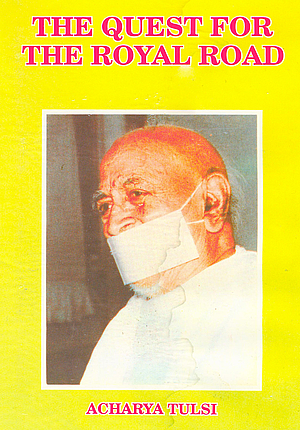A man was born on the Indian soil two thousand five hundred years ago. He was a human being and remained a human being till the end. He installed man and humanism to such a position of honour that the value of man became supreme. This human being was Mahavira. He said, "Man himself is the maker of his own destiny. He does not function under the dictates of any divine force nor is governed by it. Man's inner experience is by itself an evidence of Truth. He is not controlled by any sacred treatise or scripture. Man's endeavour shapes his destiny. And his experience gives birth to scriptures. Destiny and scriptures are subject to him, he is not subject to destiny and scriptures.
It was on account of this humanistic outlook that Vardhman became Mahavira. The flame of his endeavour burnt eternally. He constantly struggled against physical passions and sanskaras. His struggle grew stronger, his sense of detachment and friendship also grew stronger. That friendship also was not with one individual but it was universal. Universal friendship is that which is not particularly with anyone, but is spontaneous. Through his detachment and friendship, he installed himself on the religious ground where sectarian outlook and narrow- mindedness no longer existed.
Mahavira attained the state of kaivalya i.e. Perfect Liberation. And the religion he established has a sense of equality as the central theme. The origin of his religion lies in equality and it also results in equality, non-violence, non- possession, co-existence, harmony, relativism and pluralistic vision which are all part of that equality. Mahavira's non-violence leaves no scope for disparities. Twc thousand and five hundred years ago, some people used to be considered important or great by virtue of their wealth. Some people were considered great on the basis of their knowledge of the scriptures. But Mahavira considered parameters to be unrealistic and said: "No one among the human beings is superior or inferior. There is an essential unity and equality among them. A man should not be judged through imaginary values. The wealthy are not really great. Only he is great, who is capable of renouncing things. He is not great who is born in the so-called higher caste. He is great who has good character. He is not great who is well-versed in scriptures. He is great, who lives with restraint. Superiority and inferiority are relative values. The real thing is only that he is a human being in the true sense who has the power to renounce, whose character is good and who lives with restraint."
Mahavira's principle of equanimity impressed the Indian psyche. The influence has grown stronger after two thousand five hundred years. It has not diminished the least. Man did not give so much importance to the principle of equanimity, two thousand five hundred years ago as he is doing today. This is an eternal principle. Whatever is eternal can also belong to any age. The principles which Mahavira promulgated two thousand five hundred years ago are equally important and useful even for the present age. Their usefulness by itself establishes the need to observe twenty- fifth centenary of his Nirvana.
Mahavira's non-violence is essentially based on the following three elements:
1. Co-existence-According to this, seemingly opposite elements can exist together.
2. Harmony-According to it, one can harmonise between any two apparently opposite things. This is because nothing is non-relative to each other. When one has to bring about harmony between two such relative things, one has to make one primary and the other secondary. Unless this is done, it is not possible to evaluate the truth or comprehend the reality.
3. Freedom-Everything is independent by itself. It is on this philosophical support that the edifice of Mahavira's non-violence stands. While explaining non-violence in detail.
Mahavira said:
Do not kill anyone
Do not harass anyone
Do not beat anyone
Do not rule over anyone
Do not make anyone a slave
His non-violence does not contain merely the seeds of renunciation, it also contains the sparks of revolution.
These elements alone could support the modern democracy. The form of democracy cannot be decided at all without non-violence. Can democracy ever succeed without non-violence?
 Acharya Tulsi
Acharya Tulsi
